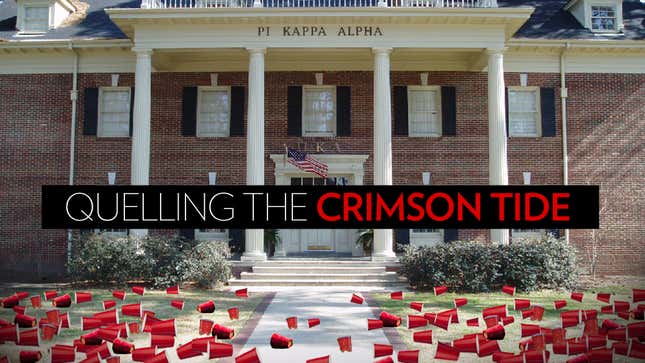After Allegations of Hazing, University of Alabama Cancels All Fall Pledging Activities
Latest

The University of Alabama takes Greek life very seriously; there are 56 fraternities and sororities on campus, and the school often tops “Best Of” Greek life lists thanks to the community’s longstanding tradition of raging hard. Perhaps too hard: University of Alabama’s administration canceled all fraternity pledgeship activities for the semester yesterday, citing a number of anonymous phone calls to the university’s hazing hotline as the impetus. But threats of “unwanted national attention” might have had something to do with it, too.
“No hell week is to take place and, I quote, if hell week does take place, there will be hell to pay from the University of Alabama,” Assistant Dean of Students Lowell Davis told the university’s student newspaper, The Crimson White, when he announced yesterday that frats would have to initiate their pledges without any further hazing — er, “pledgeship” — activities beforehand. “So please, understand that we take any allegation seriously and that we will not continue to let anything happen as it revolves around pledgeship here at the University of Alabama.”
A press release that followed shortly after the announcement named specific houses that were accused of hazing, including Pi Kappa Alpha and Delta Tau Delta, and reiterated that the decision to end pledging was due to the anonymous calls. But some students think an anonymous letter sent to the administration and leaked by The Crimson White late last month that warned the university it would receive “unwanted national attention” if it didn’t cancel pledging by October 1st may have had more to do with it than the administration is letting on.
“We represent a group of freshman men and women that are the subject of physical hazing, sleep deprivation and excessive alcohol consumption that is occurring under your stewardship of the program,” the authors wrote in the email. “The time requirement of these young men and women at the houses is too much and contributes to the aforementioned abuses that are occurring.
-

-

-

-

-

-

-

-

-

-

-

-

-

-

-

-

-

-

-

-

-

-

-

-

-

-

-

-

-

-

-

-

-

-

-

-

-

-

-

-








































